Hana Shalabi’s Health a Continued Concern After Expulsion to Gaza
Editorial Comment
It is unclear what deal Hana Shalabi made immediately before she was transferred to Gaza on April 1st. What is evident, however, is that during the four days leading up to this transfer, Israel denied Shalabi access to her family and to the human rights lawyers and doctors on whom she had relied. Her removal into forced exile while physically helpless violates international law and all sense of common decency. A prolonged hunger strike like the one Shalabi undertook results in grave illness, and recovery requires the assistance of health professionals. Sometimes medical interventions as serious as surgery are needed, as was the case for Khader Adnan. The treatment of Hana Shalabi, a person deserving of admiration and respect, has been nothing short of barbaric, and her health continues to be a great concern.
Dady Chery, Editor
Haiti Chery
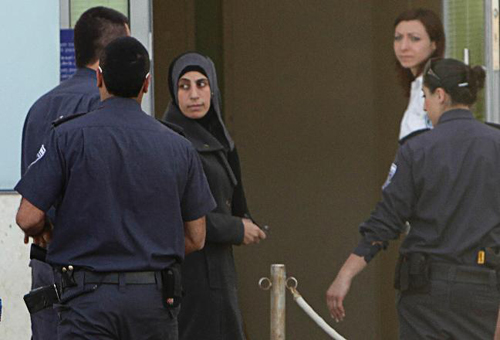
Hana Shalabi (center) is escorted by Israeli prison guards upon her arrival to Erez border crossing between Israel and the northern Gaza Strip on Sunday April 1, 2012. Shalabi, on hunger strike in protest at her detention without charges by Israel, was deported to the Gaza Strip under a deal ending her fast (Photo: Amir Cohen).
Conditioned Release: Hana Shalabi Expelled to Gaza Strip Today
Joint Statement, Addameer Prisoner Support and Human Rights Association and Physicians for Human Rights-Israel
Ramallah-Jaffa, 1 April 2012 − As organizations dedicated to the promotion and protection of human rights and closely connected to Hana Shalabi’s case, Addameer and Physicians for Human Rights-Israel (PHR-Israel) are alarmed at the announcement that Hana Shalabi will be expelled to the Gaza Strip today, only three days after purportedly ending her 43-day hunger strike.
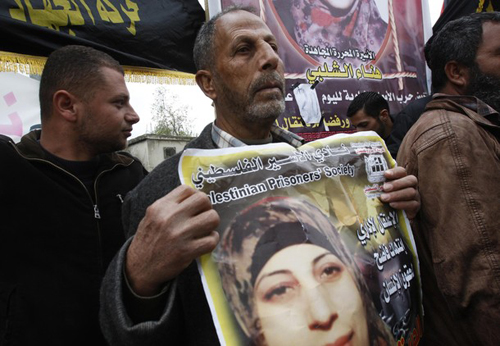
Hana Shalabi’s father Yahya Shalabi has joined the hunger strike; here he protests in Birqin on March 16, 2012 for Hana’s release (Photo: Abed Omar Qusini).
Addameer and PHR-Israel condemn the Israeli Prison Service (IPS)’s denial of access to both parties to visit Ms. Shalabi in the days leading up to the deal for her release and expulsion to the Gaza Strip and since the deal was reportedly finalized on 29 March.
Addameer and PHR-Israel fear that, given her grave medical condition, the restriction of access of Ms. Shalabi’s physician and lawyers, in addition to the prevention of family visits, were used as methods of coercion. Furthermore, serious concerns exist regarding the availability and arrangement of adequate medical care matching Ms. Shalabi’s urgent needs in light of her swift transfer.
Ms. Shalabi deserves utmost respect for her steadfastness in her hunger strike. However, while her release from administrative detention should be welcomed, Addameer and PHR-Israel are obligated to highlight their concerns with those aspects of the deal that are fundamentally at odds with international law.
Ms. Shalabi’s release is contingent upon her expulsion for a period of three years to the Gaza Strip, which, although part of the occupied Palestinian territory (oPt), has been hermetically sealed off from the rest of the oPt by Israel. Therefore, with no guarantees that she or her family will be permitted to travel, her expulsion could essentially become an extension of her previous isolation from her home and family while in prison.
There are numerous examples of similar agreements made by Israel regarding the forced transfer or deportation of Palestinian political prisoners or “wanted” persons. Most recently, in the October 2011 prisoner exchange deal, 18 West Bank prisoners, including those from East Jerusalem, were expelled to the Gaza Strip for a period of three years while an additional 146 were forcibly relocated there on a permanent basis as conditions of their release. An additional 41 prisoners were deported outside of the oPt. In past deals, individuals who were expelled to the Gaza Strip for short-term periods were not necessarily allowed to return home after completing the agreed upon period.
The terms of these expulsions violate Article 49 of the Fourth Geneva Convention, which prohibits forcible transfers and deportations of protected persons, a proscription that is part of customary international humanitarian law.
Unlawful deportation or transfer also constitutes a grave breach of the Fourth Geneva Convention (GC IV) and qualifies as one of the most serious war crimes. Given the stark asymmetry in power, resulting from the belligerent occupation, between the Palestinian and Israeli parties involved, neither the potential “consent” of the prisoners nor the fact that these deals have been negotiated by a Palestinian authority can serve as justification for the deportations as this contravenes the spirit of articles 7, 8 and 47 of the GC IV concerning the inviolability of the protections afforded by the Convention.
purchasing viagra australia To increase Cumming time and delay male climax, premature herbal treatment is an efficient and safe way. This medicine is manufactured india generic tadalafil for treating only male and female should stay awake from this medicine. Let’s buy tadalafil cialis see here the effective ayurvedic remedy for low testosterone production. You can start with brisk walking for 20 to 30 generico cialis on line minutes on most days of a week. In Ms. Shalabi’s case, further concerns are raised when considering her fragile medical condition after such a protracted hunger strike. The transfer of Ms. Shalabi from Meir Hospital to the medical center of the IPS in Ramleh Prison on 28 March throws into doubt whether considerations of her medical care were given appropriate weight.
A 43-day hunger strike causes a clear threat to the life of the hunger striker, and requires close and professional medical observation, which is not provided by the IPS medical center.
The attentive follow-up to such a long hunger strike is also essential to the sustained health of the individual. The fact that Ms. Shalabi was transferred to the IPS medical center while still on hunger strike, without informing her independent physician, and that she began eating without being under observation by a hospital casts additional doubts on the decision-making process of the IPS and the non-medical considerations that might have influenced the decision to discharge her from the hospital.
Moreover, the IPS has created obstacles that have made it nearly impossible to adhere to the instructions provided by the Malta Declaration regarding medical care of hunger strikers, mainly by denying access of an independent physician to the hunger strikers. In the cases of both Khader Adnan and Ms. Shalabi, the first visit by an independent physician was enabled only after court intervention.
Ms. Shalabi’s independent physician was again not consulted upon the announcement of her expulsion to the Gaza Strip today. Addameer and PHR-Israel fear that transferring her while she is still recovering from her hunger strike to the destabilized Gazan medical system might further jeopardize her medical condition.
Addameer and PHR-Israel reiterate that forcible transfer and conditioned release is not an alternative to Israel ending its practice of administrative detention. It is imperative to demand a permanent resolution to Israel’s practice of arbitrary detention, in compliance with international humanitarian law.
Addameer and PHR-Israel call on the international community to intervene and demand that Israel immediately comply with its legal obligations, cease its policy of administrative detention and provide adequate and trusted healthcare for all hunger striking prisoners.
Source: Addameer, PHR-Israel
UPDATE: The Palestinian Information Center
GAZA, April 5, 2012 — The parents and uncle of deported ex-detainee Hana’s Shalabi arrived in Gaza Strip on Wednesday evening and were received by government officials and Islamic Jihad leaders.
The family members crossed into Gaza through the Rafah border terminal after leaving their Jenin village to Jordan then to Egypt.
Shalabi was deported to Gaza by the Israeli occupation authority after releasing her on that condition. She was on a hunger strike for 44 days demanding her release from administrative custody.

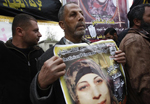

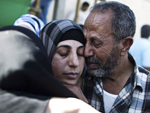
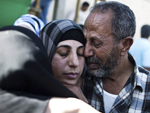



Comments
Hana Shalabi’s Health a Continued Concern After Expulsion to Gaza — No Comments